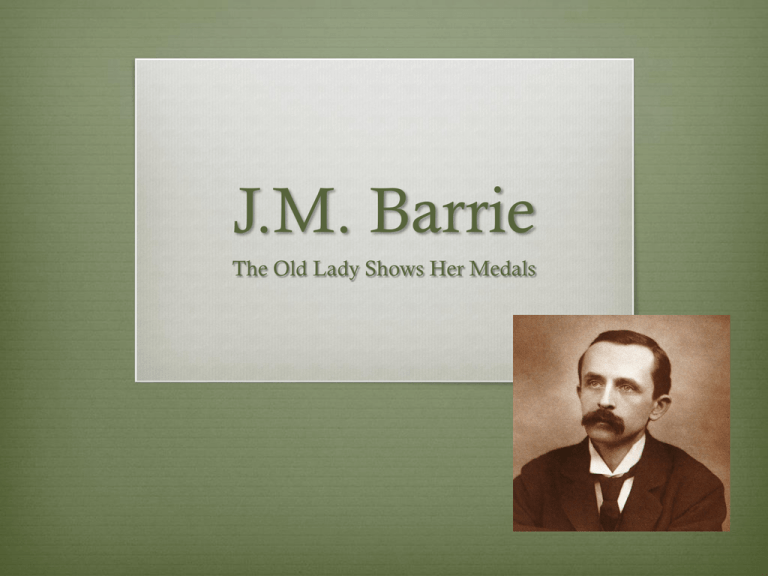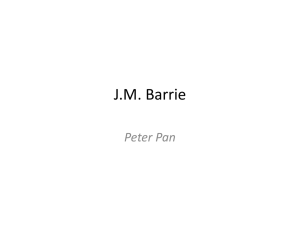
J.M. Barrie
The Old Lady Shows Her Medals
Barrie and Peter Pan
James M. Barrie (1860-1937), Scottish author and dramatist,
best known for his character Peter Pan. The play Peter Pan or,
The Boy Who Would Not Grow Up was first performed in 1904
and published in 1928;
All children, except one, grow up. They soon know that they will
grow up, and the way Wendy knew was this. One day when she was
two years old she was playing in a garden, and she plucked another
flower and ran with it to her mother. I suppose she must have looked
rather delightful, for Mrs. Darling put her hand to her heart and
cried, "Oh, why can't you remain like this for ever!" This was all
that passed between them on the subject, but henceforth Wendy knew
that she must grow up. You always know after you are two. Two is
the beginning of the end.--Ch. 1
Other titles in the Peter Pan series
The Little White Bird: or, Adventures in Kensington Gardens
(1902), Peter Pan in Kensington Gardens (1906), When Wendy
Grew Up: An Afterthought (1908), and Peter and Wendy
(1911). The ever popular characters of Peter, Wendy,
Tinker Bell, The Lost Boys, Captain Hook, and the other
pirates, indians, and fairies have inspired numerous
adaptations to the stage, television, and film. The 2004
film “Finding Neverland” is based on Barrie’s life.
Biography
James Matthew Barrie was born on 9 May, 1860 in the burgh
of Kirriemuir, Angus, Scotland, the son of weaver David Barrie
and his wife Margaret Ogilvy. They were a large family and
James, short in stature at 5 feet 1 inch, had three brothers and
six sisters. His brother David died at the age of fourteen in a
skating accident, and the profound sadness of his mother
deeply affected young James. An active and theatrical boy, he
loved to entertain and at a very early age was organizing plays
and acting in them with his friends and siblings. He wanted to
be a writer and loved to read including the works of Jules
Verne and James Fenimore Cooper. James attended school in
Kirriemuir before entering Edinburgh University, during the
four years of which he had articles published in newspapers.
He earned his degree of Master of Arts in 1882. He then
obtained a job as a writer with the Nottingham Journal, and in
1885 moved to London, England.
Early credits
Barrie was successful at freelancing and soon bringing in a
modest income for himself. Auld Licht Idyls or “Old
Lights”, stories based on life in Kirriemuir, fictionalized
as `Thrums’, and partly about the religious sect his
mother belonged to, was first printed in 1888 and soon
became popular. Other titles in the `Thrums’ series are A
Window in Thrums (1889) and The Little Minister (1891).
Sentimental Tommy (1896) and Tommy and Grizel (1900)
followed. In 1897 he published his tribute to his mother
Margaret Ogilvy.
Growing fame
Barrie was now attracting the attention of such notable
writers as George Bernard Shaw, H.G. Wells, Thomas
Hardy, and Robert Louis Stevenson, whose adventure
stories with swashbuckling pirates Margaret had read to
Barrie as a child. Three Men in a Boat (1889) author Jerome
K. Jerome was one of the many friends Barrie formed a
cricket playing club with called the “Allahakbarries”, the
name a combination of Barrie’s and the Arabic phrase
meaning `May the Lord help us.’ Barrie also collaborated
with fellow Scot and cricket player Sir Arthur Conan
Doyle on the opera titled Jane Annie or, The Good Conduct
Prize. Though it was not successful their friendship was
lifelong.
Marriage
In 1894 Barrie married actress Mary Ansell, and they
honeymooned in Switzerland where they got a St.
Bernard puppy, which would later inspire the character
Nana. They would have no children of their own, but a
few years later Barrie met and became good friends with
the Llewelyn Davies family while out strolling in
Kensington Gardens. He entertained their five sons with
stories, basing his characters, including Peter Pan, on
them. He would later become guardian to the children
when they were orphaned.
Successes
Other plays by Barrie are his parody Ibsen’s Ghosts (1891);
Quality Street and The Admirable Crichton, both of which were
first performed in 1902; What Every Woman Knows (1908); Dear
Brutus (1917), a play in 3 acts; and The Boy David (1936).
Barrie was knighted in 1913 and the same year he became
rector of St. Andrews University where he delivered his famous
address on `courage’. In 1922 he received the Order of Merit,
and in 1928 became President of the Society of Authors. In
1929 he had a camera obscura built in Kirriemuir. Sir James
Matthew Barrie died on 19 June, 1937 and lies buried in the
Kirriemuir cemetery alongside his parents, sisters, and brother
David.
Death and burial
Universally Mourned, his obituary was published in The
Illustrated London News on 26 June, 1937. There are now
many statues of Peter Pan including the one in
Kensington Gardens. Ever the benevolent and caring
figure towards children, one of Barrie’s last wishes was
that any royalties from Peter Pan be rewarded in perpetuity
to the Great Ormond Street Hospital for Sick Children in
London, England, though there is now some complexities
surrounding copyright. Barrie’s birthplace in Kirriemuir is
now part of the Scottish National Trust.
Biography written by C.D. Merriman for Jalic Inc. Copyright
Jalic Inc. 2006. All Rights Reserved.
Full Length Plays
Alice Sit-By-The-Fire
Dear Brutus
Peter Pan
Quality Street
The Admirable Crichton
What Every Woman Knows
Short plays
Jane Annie
The Legend of Leonora
Mary Rose
The Old Lady Shows Her Medals
Peter and Wendy
The New Word
Charwoman
Winkles
Salonikkey
The Black Watch
Old Lady Clips
Screen Guild Radio Players
Live Stage Production
Rep Stage Maryland Promo
Film version
Seven Days Leave with Gary Cooper
Peter Pan on NBC
Mary Martin
Cathy Rigby
Disney
Hook (Spielberg)
Once Upon a Time
Finding Neverland (film)
Finding Neverland (musical)
The Harvey Weinstein-produced musical “Finding
Neverland” has found its Broadway home, nabbing the
Lunt-Fontanne Theater for an April opening.
Based on the 2004 Miramax feature, the musical has
taken a roundabout route to New York, starting in a
U.K. incarnation with a different creative team before
an overhaul brought on board book writer James
Graham, songwriters Gary Barlow and Eliot Kennedy
and director Diane Paulus (“Pippin,” “Porgy and
Bess”). Matthew Morrison was cast for the lead role of
J.M. Barrie.
Set design for A.R.T. production


